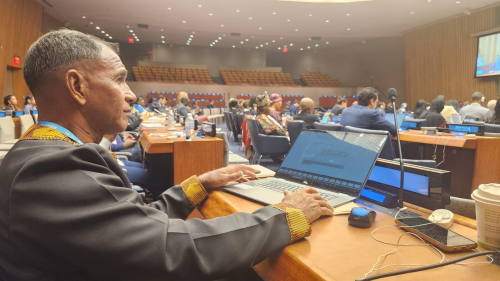 James Finies, leader of Pueblo Progresivo Uni, and Davika Bissessar Shaw, President of the Bonaire Human Rights Organization, recently participated in the High-Level Meeting “Justice for Africans and People of African Descent Through Reparations” at the United Nations Headquarters in New York.
James Finies, leader of Pueblo Progresivo Uni, and Davika Bissessar Shaw, President of the Bonaire Human Rights Organization, recently participated in the High-Level Meeting “Justice for Africans and People of African Descent Through Reparations” at the United Nations Headquarters in New York.
Hosted by the United Nations Office of the Special Adviser on Africa (OSAA), the President of the UN General Assembly (PGA), and the African Union Permanent Observer Mission to the UN (AUPOM), the event featured the participation of UN Secretary-General António Guterres, UN General Assembly President Philemon Yang, and African Union Chairperson Mahmoud Ali Youssouf. It brought together global leaders to advance reparative justice and sustainable development for Africa and its Diaspora.
James Finies of Bonaire delivered a statement to the meeting alongside representatives of Member States.
Speech:
Repair of Human Dignity for People of African Descent in the Caribbean – The People Left Behind
Haiti sparked the journey toward repair of dignity and decolonization in the Americas in 1804. Over two centuries later, the people of Bonaire remain under unresolved colonial rule. Eighty years after the founding of the United Nations, we issue an urgent appeal: the people of Bonaire are facing cultural and ethnic erasure.
Bonaire, an island just 50 miles off the coast of Venezuela, was unilaterally integrated into an European colonial constitutional framework in 2010—against the will of its people and under unequal legal conditions. Since then, laws foreign to our values and identity have been imposed. One of the most troubling is the euthanasia law—a practice that violates our deep cultural respect for life.
Eighty percent of Bonairians are of African descent. For us euthanasia is not an act of compassion but a violation of life. Our people have consistently and publicly rejected this law, which clashes with our ethical, religious, and cultural beliefs. Yet, despite mass opposition, it was enforced without consent through colonial rule.
The consequences have been profound. Since its introduction, Bonaire’s death rate has doubled. Even more alarming is the demographic shift: our native population has declined from 80% in 2010 to around 30% today. For comparison, in Palestine—after decades of conflict—the decline is approximately 6%. On Bonaire, a decline of 50% in a single decade—without bombs or bullets, but through policies that ignore our humanity.
This struggle cannot be separated from the legacy of transatlantic slavery, colonialism, and extractive systems that devastated Africa and its diaspora. As Chimamanda Ngozi Adichie warns, ignoring history blinds us to the present. Our challenges today are rooted in centuries of exploitation and imposed rule. True justice demands reparatory frameworks that restore dignity and empower communities like ours to reclaim cultural, economic, and political control. Sustainable development is impossible without justice, inclusion, and self-determination.
We are now a minority on our ancestral land, facing the dire threat of cultural extinction. This is modern colonialism—quiet, systemic, and deeply destructive.
Our recommendation: We urge the international community to prioritize the recognition and decolonization of remaining territories like Bonaire as part of the global reparatory justice agenda.
All human beings are born free and equal in dignity and rights. So are we—the people of Bonaire.
We will not be silent. We call upon the world to stand with us in our struggle to justice, to repair and reclaim our right to life, right to dignity, and right to self-determination.
video UN WEB TV: https://www.youtube.com/watch?v=eZFlbrz064c










